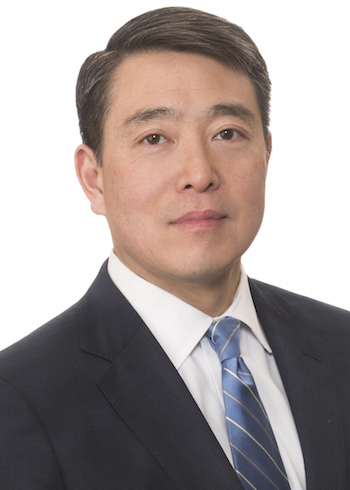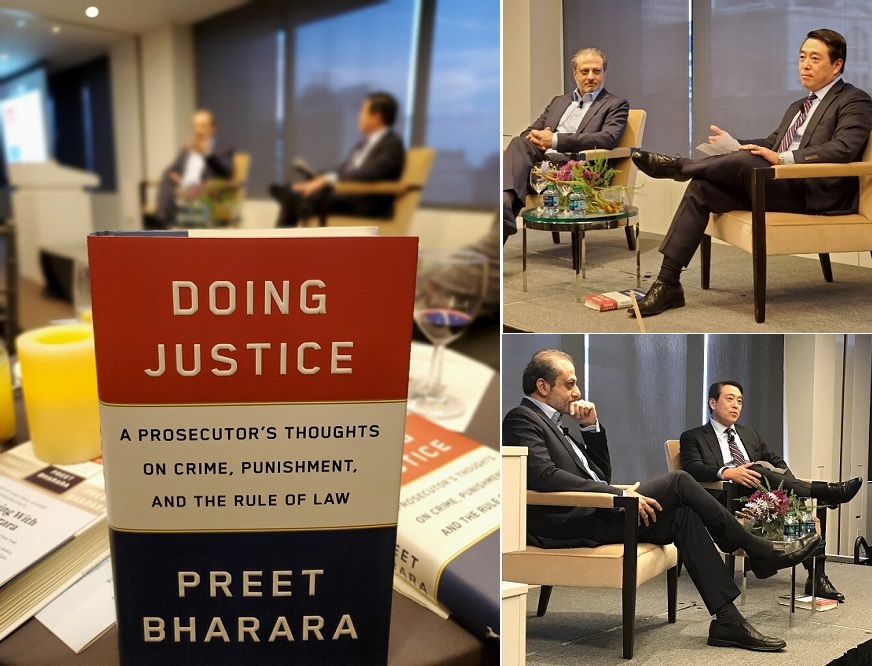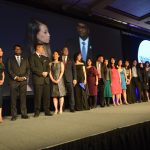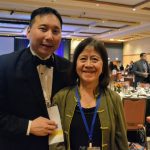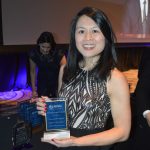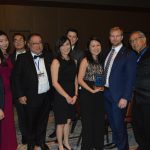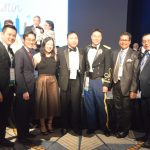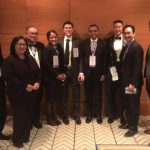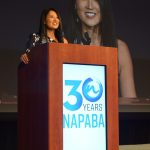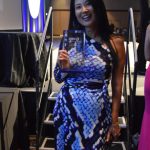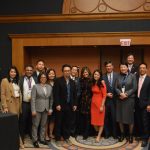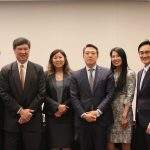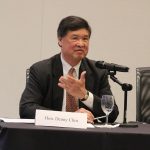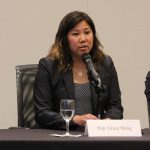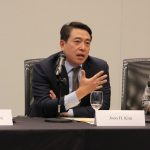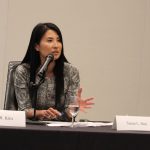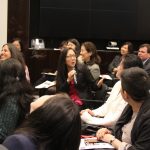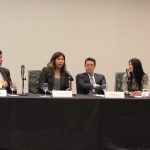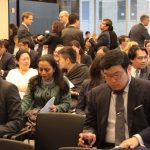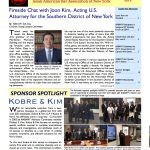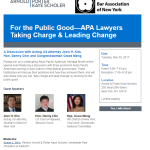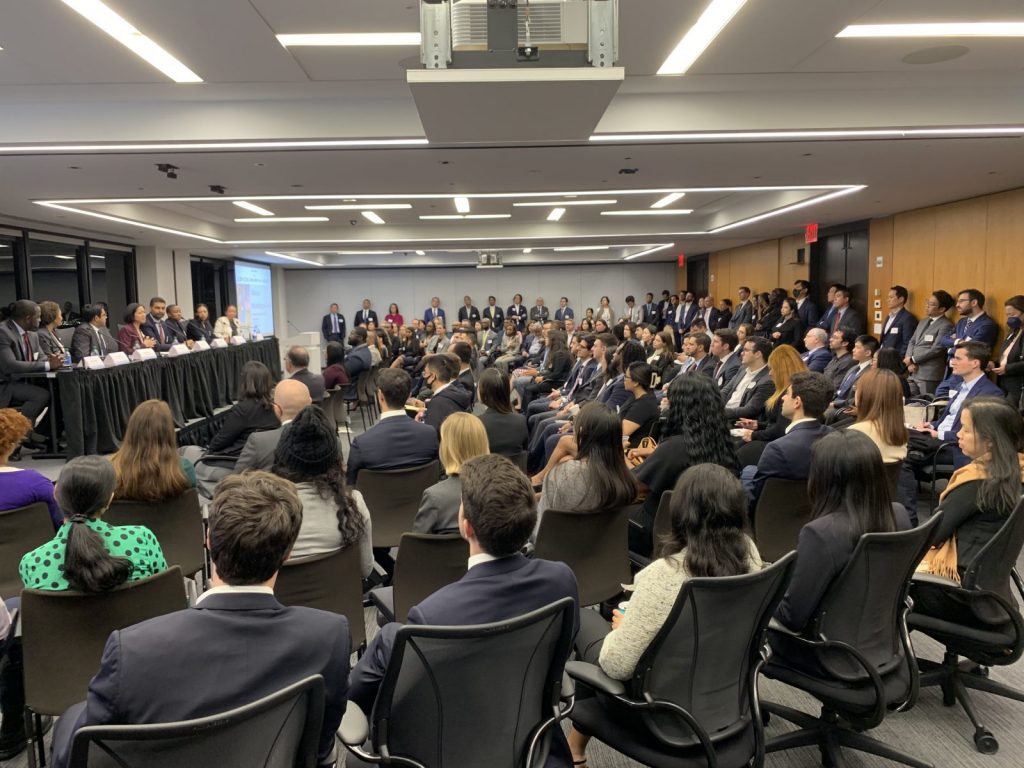
On November 17, AABANY together with several other bar associations co-sponsored a program on “Becoming an AUSA,” hosted by Cleary Gottlieb at their New York office.
Joon Kim, former Acting United States Attorney of the Southern District of New York (SDNY) (and longtime AABANY member) gave opening remarks to welcome the standing room only crowd of more than 100 attendees. He reflected on his years serving with Preet Bharara and then succeeding him after his much-publicized termination during the prior Presidential administration. To this day, Joon remembers the gravity and weight of the words, “My name is Joon Kim, and I represent the United States” whenever he appeared before a judge or jury. The seriousness of representing the United States in numerous cases of public importance has never been lost on Joon. Now a Partner at Cleary, Joon was the first Asian American Acting United States Attorney in the Southern District, following Preet Bharara, who was the first Asian American United States Attorney in the Southern District.
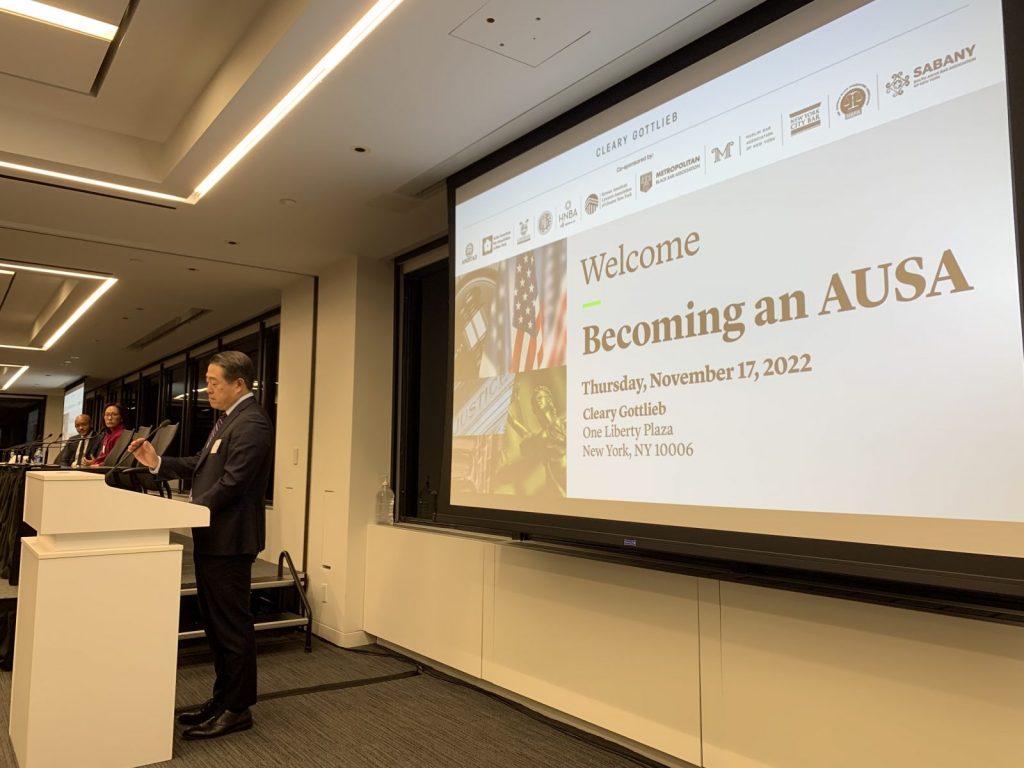
Una Dean, former Assistant US Attorney in the Eastern District of New York (EDNY) and now in-house counsel at IBM, helped organize the program and moderated the opening panel with current United States Attorneys Damian Williams (SDNY) and Breon Peace (EDNY). Una was also a past AABANY Board member.
Both Breon and Damian spoke about their paths to the US Attorney’s office and their desire to work on matters that would have positive community impact. Both expressed the belief that the US Attorney’s office provides a unique opportunity to do just that. Breon talked about criminal investigations and prosecutions his office has been doing, including a case that helped prevent a potential terrorist attack at the US Open. His office prosecuted R. Kelly for human trafficking. They fight hate crimes and also work on affinity fraud cases which target vulnerable members from diverse ethnic and religious communities in New York. In criminal cases, his office actively seeks out alternatives to incarceration and diversion programs as ways to resolve criminal complaints, and also supports programs that facilitate re-entry into society for formerly incarcerated persons. On the civil side, EDNY pursues civil rights cases, fights housing discrimination and brings cases to protect the environment. His civil rights division has also been addressing claims about NYPD’s handling of sexual assault complaints from survivors.
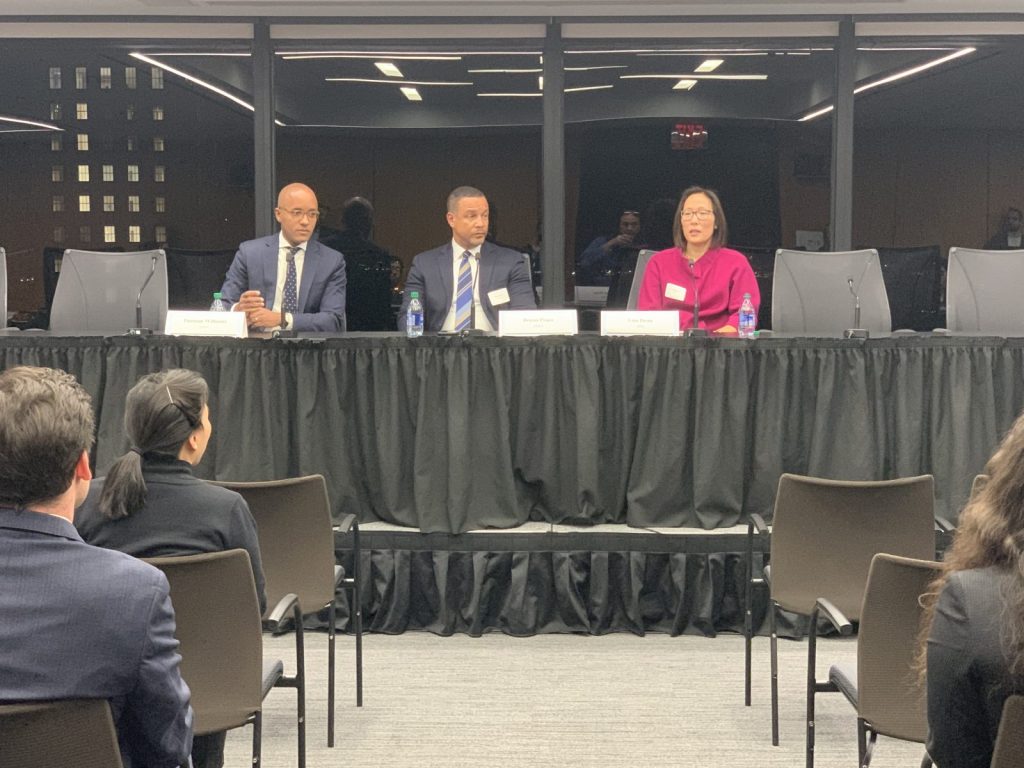
Damian, after being trained at a prominent law firm, believed that, for his further development as a litigator and trial lawyer, the US Attorney’s office was the next logical step. Damian has served in the SDNY for a decade and spoke about his time at the SDNY with great passion and fondness, and his love for the work is palpable. “It is the best job in the world, and the best job I can ever hope to have,” he declared. Assistant US Attorneys fight bullies, he noted, and he relishes working in an environment where everyone is dedicated to doing the right thing, serving the public interest.
Una asked both Damian and Breon what qualities they look for in candidates for their offices. Damian answered that they are looking for good, decent, human beings – “no sharp elbows” – who are team oriented. In other words, they don’t want any jerks. (He used a stronger word, but you know what he means.) Candidates should be good writers who are smart, can think on their feet and exercise good judgment. They must have a strong moral compass, a sense of right and wrong, because so much authority is delegated to junior attorneys at his office, and they must be “doing the right thing, the right way – always.” Candidates need to have a tremendous amount of energy, because they will be working hard. If you are looking for a lifestyle change or money, Damian advised, working at the US Attorney’s Office may not be right for you.
Breon agreed with Damian and added that for him, any candidate that has a win-at-all-costs mentality raises a major red flag. He believes in doing justice, and that means at times, his office may have to decline cases or admit error. A candidate that rushes to judgment would not work out. He also looks for attorneys with the courage to tell investigators or judges that the evidence is not there to bring a case or to prosecute a defendant.
Una then talked about the reason why she put this program together, noting that during her time at EDNY, the composition of the office did not reflect the makeup of the community they served. Breon responded that “it is incredibly important that the [EDNY] is a reflection of the community.” He wants people of diverse backgrounds and experiences in his office to help solve problems, because “diversity is critical to getting the work done.” To promote diversity, EDNY has made changes to make hiring more diverse and inclusive, such as by making the process more transparent, has implemented a mentoring program for all new AUSAs and has sponsored trainings through the Diversity Committee.
Damian pointed out that he is the first African American US Attorney at SDNY and acknowledged that diversity is a challenge that needs to be addressed. He believes that outcomes are better when there are diverse views on the team. He also offered that the jury box will look like New York, so the government table should try to look like New York as well. Damian emphasized that politics has no role to play in the US Attorney’s office, no matter who the sitting President happens to be. He shared that Justice Sotomayor, at the start of her career was an Assistant District Attorney in Manhattan, and in a recent speech, she stated that she became a prosecutor because “it gave her the broadest option to do justice.” Damian agrees with that view.
Breon and Damian both closed by extolling the virtues of public service, particularly at the US Attorney’s office. Damian finds it hard to leave his desk each night because of all the great cases he gets to work on. “When I go home at night,” Breon declared, “I feel like I’ve done something good for the community.”
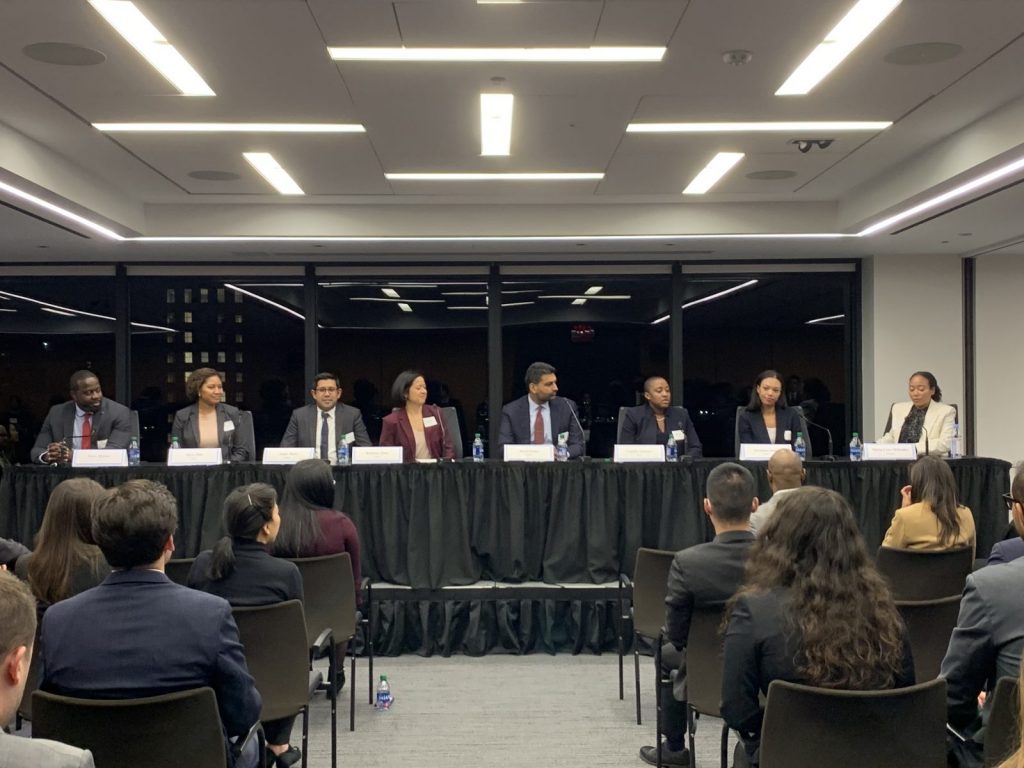
After Damian and Breon spoke, the program shifted to a panel of attorneys of color from both SDNY and EDNY, in both criminal and civil divisions, moderated by former AUSA Maria Cruz Melendez, now a Partner at Skadden. The panel included:
· Sagar Ravi, Assistant U.S. Attorney & Co-Chief, Complex Frauds & Cybercrime Unit, SDNY
· Rebecca Tinio, Assistant U.S. Attorney & Co-Chief, Civil Frauds Unit, SDNY
· Hiral Mehta, Assistant U.S. Attorney & Deputy Chief, Business and Securities Fraud Section, EDNY
· Marietou Diouf, Assistant U.S. Attorney, International Narcotics and Money Laundering Section, EDNY
· Camille Fletcher, Assistant U.S. Attorney, Narcotics Unit, SDNY
· Dara Olds, Assistant U.S. Attorney, Civil Division, EDNY
· Ivory Bishop, Assistant U.S. Attorney, General Crimes, EDNY
All the panelists echoed the passion of Damian and Breon in their love of their work and the weight accorded to representing the United States in court on important cases of great public interest, in both criminal and civil matters.
Hiral Mehta (EDNY) spoke about the proactive nature of the office and the flat structure. There is no hierarchy, and everyone’s input is sought. Ivory Bishop (SDNY) talked about getting to work on all types of cases, from street crimes to public corruption.
Rebecca Tinio (SDNY) mentioned that her cases were great for training, because they go to trial. Her unit works on high stakes cases, such as the tax and bankruptcy case involving Purdue Pharma, the anti-kickback cases involving Novartis, and groundbreaking cases involving the Clean Air Act.
Maria asked the panel what role diversity plays in the cases that the offices see. The panelists gave examples from cases they worked on, in which their own diverse backgrounds and experiences allowed them to connect with and relate to the witnesses in the case, ultimately leading to successful outcomes.
Maria asked the panel to address the hiring process. Dara Olds (EDNY) stated that her office has separate criminal and civil tracks. Rebecca (SDNY) explained that her office has one unified process for all applicants. Both offices have initial interviews, some conducted by those on the panel. Both offices request writing samples, which are reviewed to determine whether a candidate will advance. If the candidate gets through the first round, they are interviewed by more senior AUSAs, including section chiefs. The final round would involve the US Attorney and their executive staff.
Sagar Ravi (SDNY) stated that they are always accepting applications, and Hiral (EDNY) confirmed the same for his office, except during times when a hiring freeze is in place. Currently, there is none so right now “the doors are open.”
What if an applicant thinks that they do not have the right credentials to apply? Dara (EDNY) noted that the US Attorney’s office does not accept applicants straight from law school and encouraged everyone who has obtained several years of experience to apply, regardless of whether they are applying from a large firm or if they had clerked for a judge. Camille Fletcher (SDNY) advised that even if you don’t get called for an interview the first time, you should try again.
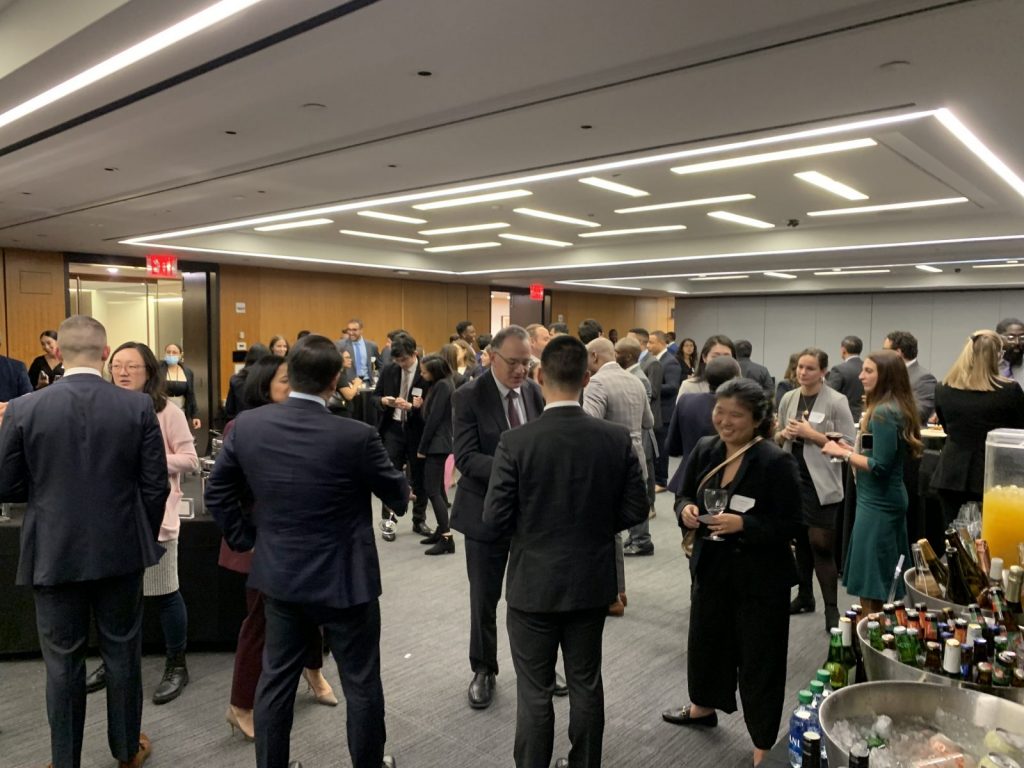
After the panels were done, all the attendees stayed for a reception with food and drinks generously provided by Cleary. Many of the panelists stayed to speak directly with the panelists and ask the questions they were not able to during the main program. The room was buzzing with lively conversations among prosecutors, attorneys, and law students in attendance.
Much thanks and appreciation go to all the speakers and moderators for the evening. Thanks to Una Dean for spearheading the event, to Cleary for being such a gracious host, and to all the co-sponsors:
· Amistad Long Island Black Bar Association
· Caribbean Attorneys Network
· Dominican Bar Association
· Hispanic National Bar Association – Region II
· Korean American Lawyers Association of Greater
New York
· Metropolitan Black Bar Association
· Muslim Bar Association of New York
· New York City Bar Association
· National Black Prosecutors Association
· South Asian Bar Association of New York


